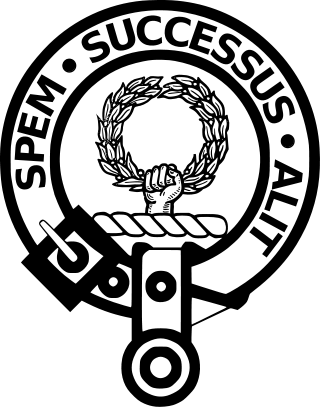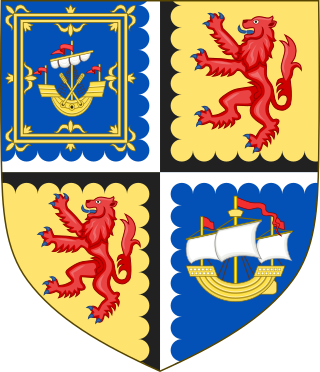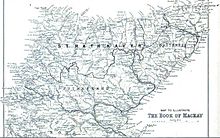
Clan Ross is a Highland Scottish clan. The original chiefs of the clan were the original Earls of Ross.

Clan Mackay is an ancient and once-powerful Highland Scottish clan from the far North of the Scottish Highlands, but with roots in the old Kingdom of Moray.

Clan Sutherland also known as House of Sutherland is a Highland Scottish clan whose traditional territory is the shire of Sutherland in the far north of Scotland. The chief of the clan was also the powerful Earl of Sutherland, however in the early 16th century this title passed through marriage to a younger son of the chief of Clan Gordon. The current chief is Alistair Sutherland who holds the title Earl of Sutherland.
The Munros of Milntown were a family cadet branch of the Highland Clan Munro. As the earliest recorded cadet branch of the Munro chiefs, the Munros of Milntown were the 'senior' cadet branch of the clan, and spawned many cadet branches. They were frequently recorded as 'Monro' as well as Munro. The Munros of Milntown are notable for being involved in events concerning the history of the late Middle Ages in the Scottish Highlands.

The Battle of Tuiteam Tarbhach was a Scottish clan battle in which the Mackays wiped out raiders from the Clan MacLeod of Lewis who were returning from an attack on Mackay land in Strathnaver. The Mackays caught up with the raiders on the north bank of the River Oykel some three miles west of where the river joins the River Cassley at the head of the Kyle of Sutherland. The battle probably took place in 1406, but the date is uncertain from the manuscripts.

The Battle of Tannach was a Scottish clan battle fought about 3 miles (4.8 km) southwest of Wick, in the far north of Scotland. It was fought between men of the Clan Keith and Clan Mackay from Strathnaver against men of the Clan Gunn and possibly their allies the Clan Oliphant and Clan Sutherland from Caithness. The date is uncertain, it was probably in 1464 but may have been in 1438.

The Battle of Tarbat was a Scottish clan battle fought in the 1480s on the Tarbat peninsula, in Easter Ross. The Clan Ross cornered a raiding party of Clan Mackay near the village of Portmahomack and put many of them to the sword. The survivors sought sanctuary in the nearby church but the Rosses set fire to it, killing all inside. The Mackays took revenge for this outrage in the subsequent Battle of Aldy Charrish.

The Battle of Aldy Charrish was a Scottish clan battle that took place on 11 July 1487. The Clan Mackay and possibly the Clan Sutherland defeated the Clan Ross and their allies in the Scottish Highlands, probably on the south side of Strathoykel.

The Battle of Alltan-Beath, also known as the Battle of Ailtan-Beath, was a Scottish clan battle said to have taken place in 1542 in the village of Knockarthur, in Sutherland, in the Scottish Highlands. It was fought between men of the Clan Mackay and men of the Clan Sutherland whose chiefs were the Gordon, Earls of Sutherland.
Robert Munro, 14th Baron of Foulis was a Scottish soldier and clan chief of the Highland Clan Munro. He was seated at Foulis Castle. Although he is traditionally the 14th Baron and 17th overall chief of the clan, he is only the 7th Munro chief that can be proved by contemporary evidence.

Dingwall Castle was a medieval fort and royal castle in the town of Dingwall, eastern Ross-shire, Scotland.

The Mackays of Aberach also known as the Clan Aberach are a Scottish family and a branch of the ancient Clan Mackay of the Scottish Highlands. They were the senior cadet branch of the Clan Mackay and were seated at Achness, in Strathnaver, which is in modern-day Sutherland. In Scottish Gaelic they are known as the Sleaght-ean Aberigh.
Huistean Du Mackay, 13th of Strathnaver, was the thirteenth chief of Clan Mackay, a Highland Scottish clan.

The Mackays of Scoury were a minor noble Scottish family and a branch of the ancient Clan Mackay, a Highland Scottish clan. They were seated at Scourie Castle, in Scourie, in the parish of Eddrachillis, county of Sutherland. However, Scourie was part of the Mackay chief's province of “Strathnaver” until it was sold to the Earl of Sutherland in 1829.
Neil Mackay, 8th of Strathnaver, was in the 15th century the eighth chief of the ancient Clan Mackay, a Scottish clan of the Scottish Highlands. He is sometimes also recorded as Neil Bass Mackay or Neil Wasse Mackay which was a nickname taken from the fact that for a time he was a prisoner on the Bass Rock.
Iye Roy Mackay, 10th of Strathnaver, was the tenth chief of the ancient Clan Mackay, a Scottish clan of the Scottish Highlands.
Donald Mackay, 11th of Strathnaver, was the eleventh chief of the ancient Clan Mackay, a Scottish clan of the Scottish Highlands.

The Stand-off at Bengrime took place in 1601 and was a stand-off between the armies of John Gordon, 13th Earl of Sutherland and George Sinclair, 5th Earl of Caithness. Bengrime is in the county of Sutherland, Scotland.

George Sinclair was a Scottish nobleman, the 5th Earl of Caithness and chief of the Clan Sinclair, a Scottish clan based in northern Scotland.
Lachlan Mor Mackintosh, 16th of Mackintosh was the chief of the Clan Mackintosh, a Scottish clan of the Scottish Highlands. He was also chief of the confederation of clans that was known as the Clan Chattan.












